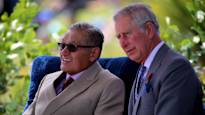Ngā Wai Hono i te Pō is the second queen and eighth monarch of the Kiingitanga movement that united the Maori tribes.
21:09•Updated 21:19
The Maori have had a new queen in a traditional ceremony in Ngāruawāhia, New Zealand.
The Maori elders chose the youngest child and daughter of the dead king Ngā Wai Hono i te Pōn to be queen. They call him New Dawn.
The new queen arrived at the ceremony site in a procession accompanied by the shouts and stomping of Maori dancers. He took his place on the throne beside which his father had been placed, Tuheitia Pootatau of The Wherowhero VII chest.
The King’s funeral was held immediately after the naming ceremony. He died in hospital after heart surgery last Friday.
The Maori do not crown their queen, but the archbishop in the ceremony Don Tamihere placed the Bible on her head, which has been in use since the election of the first king since 1858. The archbishop also anointed the queen’s hands with holy oils, which are supposed to endow the queen with prestige, holiness, power and spiritual principle.
The choice was made by Maori parents representing 12 tribes. The late king also had two sons, but the choice fell on a daughter who represents the new generation of Maori resistance.
A New Zealander radio channel RNZ according to it is unknown whether King Tuheitia Pootatau The Wherowhero VII expressed before his death who he hoped would be his successor. However, in recent years Ngā Wai Hono i te Pō has often been seen alongside his father representing Māori.
A direct descendant of the first king
Queen Ngā Wai Hono i te Pō is the second queen and eighth monarch of the Kiingitanga movement. The movement was created in 1858 to unite the Maori tribes of New Zealand against British colonial rule. The aim of the movement was also to preserve the Maori language, culture and lands.
Britain colonized New Zealand in 1840.
The new queen holds a master’s degree in Maori traditional tikanga law and has worked to revive the Maori language.
– We follow the tikanga law of our ancestors. They created Kiingitanga to unite our people and improve their status, Chairman Che Wilson quoth.
Ngā Wai Hono i te Pō is a direct descendant of the first king. The monarch has no judicial or legal authority in New Zealand, but is the supreme leader of several Maori tribes.
New Zealand’s centre-right government has overturned the decisions of previous governments that sought to strengthen the Maori language, improve the living conditions of the indigenous people and correct the wrongs done to the Maori during British colonization.
The original Maori have lived in New Zealand since the 14th century. There are about 900,000 of them.
